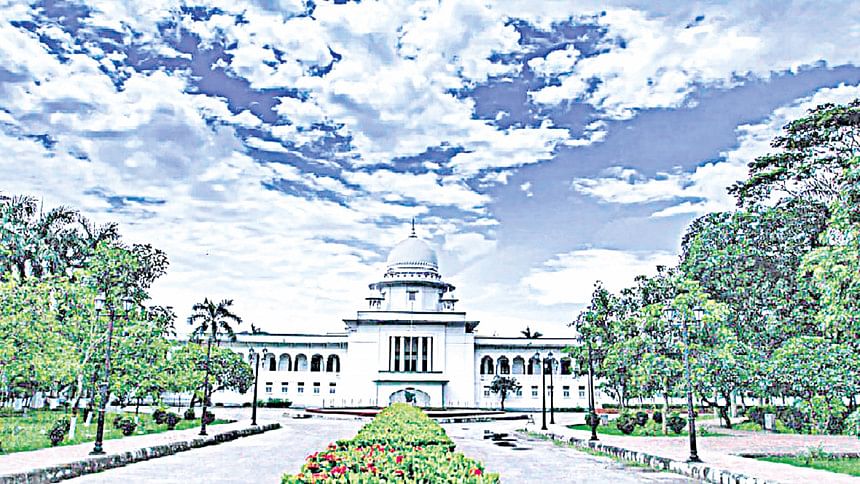Notable decisions of the Supreme Court of Bangladesh

Last year witnessed an array of major judicial decisions shaping the jurisprudence and legal discourse in Bangladesh. Indeed, throughout the year, the High Court Division (HCD) and the Appellate Division (AD) of the Supreme Court of Bangladesh (SCB) handed down several significant judgments, of immense constitutional importance, among others.
The 15th Amendment to the Constitution has been partially invalidated.
The HCD has delivered a landmark judgment invalidating the 15th Amendment to the Constitution partially. A total of 54 changes were brought by the 15th Amendment in 2011. The major changes include scrapping the provision for a non-partisan Caretaker Government (CTG) to hold elections, incorporating an inexhaustive list of basic structure to the Constitution (Article 7B), etc. The HCD bench comprising Justice Farah Mahbub and Justice Debasish Roy Chowdhury gave the verdict, scrapping parts of the 15th amendment reinstalling the provision of CTG, omitting Articles 7A, 7B, etc. The final decision regarding the CTG will be taken by the Appellate Division as three review petitions are pending in it challenging a 2011 verdict that had scrapped the system.
Supreme Judicial Council (SJC) has been reinstalled
The AD of the SCB has recently scrapped the 16th Amendment of the Constitution. The SJC is a body composed of the Chief Justice and two other senior most judges of the AD to probe allegations on the grounds of incapacity or misconduct against any judge of the Apex court. The 16th Amendment scrapped the SJC and gave the power to the parliament in 2014. The 16th Amendment was invalidated by both the HCD and the AD in 2016 and 2017, primarily focusing on the doctrine of 'separation of power' and concerns regarding judicial independence. However, when the government filed the review petition, the matter reached a legal stalemate and continued in that state until recently, when the AD again declared the 16th Amendment unconstitutional.
Throughout the year, the High Court Division and the Appellate Division of the Supreme Court of Bangladesh handed down several significant judgments of immense constitutional importance.
Discouraging disclosure of the sex of unborn babies
The HCD of the SCB has ruled that the guideline by the Directorate General of Health Services (DGHS) discouraging revealing the sex of unborn babies be followed. Prenatal sex detection oftentimes has a direct connection with the ill-treatment of babies and pregnant mothers. That is why the DGHS, in their guideline, discouraged hospitals, clinics, and diagnostic centres from revealing the sex of unborn babies for non-medical reasons. The HCD disposed of the writ petition seeking a ban on such disclosure by directing that the guidelines of the DGHS be followed.
Revising the quota scheme
The AD of the Apex Court of the country has revised the existing quota scheme, which some have embraced positively, while others raised concern over the level of interference in policy decisions done in the case. Prior to the decision of the AD, the HCD had decided that the notification by the government in 2018 withdrawing the quota system in government jobs was illegal. However, the AD reversed the decision of the HCD. The new quota scheme is applicable for government jobs in all grades. As per the new scheme, a seven percent quota is reserved for all jobs: five percent for children of freedom fighters, martyred freedom fighters and Beerangonas, one percent for the indigenous community, and one percent for people with disabilities and 'Tritiyo Lingo'.
The imposition of conservancy fees under section 3 of Conservancy and Pilotage Service Fees Rules 1990 is legal
The plaintiffs of the original case alleged, amongst others, that the imposition of conservancy fees under the 1990 Rules is illegal. The AD of the SCB found that, firstly, such imposition of fees under the 1990 Rules is justified and not at all a breach of the principle of double jeopardy. It moreover concluded that the imposition of conservancy fees is not a punitive measure but rather an investment in sustainable water management. Such measures are needed for both our economic interests as well as out of environmental concerns. In a country with concerning environmental conditions, such decisions by the Apex Court of the country are appreciable.
The legitimacy of the interim government under the current Constitution
The AD of the SCB on 8 August 2024 decided that the President of Bangladesh may, to fill in the constitutional vacancy, for urgent necessity, appoint chief advisor and other advisors to conduct executive functions on an interim basis. The AD exercised its power under Article 106 of the Constitution which allows it to give opinions to the President when the President seeks the same on a question of law of great public importance. The AD noted that as the previous Prime Minister resigned and the President dissolved the previous parliament, such an interim government could be established as of necessity. This decision by the AD was important to maintain the constitutional continuity of the country.
The writers are Law Desk Assistant and Law Desk Intern of the Law & Our Rights, The Daily Star, respectively.

 For all latest news, follow The Daily Star's Google News channel.
For all latest news, follow The Daily Star's Google News channel. 



Comments